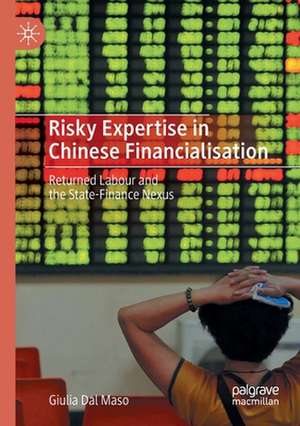Risky Expertise in Chinese Financialisation: Returned Labour and the State-Finance Nexus
Autor Giulia Dal Masoen Limba Engleză Paperback – 7 noi 2021
| Toate formatele și edițiile | Preț | Express |
|---|---|---|
| Paperback (1) | 383.93 lei 6-8 săpt. | |
| Springer Nature Singapore – 7 noi 2021 | 383.93 lei 6-8 săpt. | |
| Hardback (1) | 390.25 lei 6-8 săpt. | |
| Springer Nature Singapore – 6 noi 2020 | 390.25 lei 6-8 săpt. |
Preț: 383.93 lei
Nou
Puncte Express: 576
Preț estimativ în valută:
73.47€ • 75.80$ • 62.18£
73.47€ • 75.80$ • 62.18£
Carte tipărită la comandă
Livrare economică 05-19 martie
Preluare comenzi: 021 569.72.76
Specificații
ISBN-13: 9789811568268
ISBN-10: 981156826X
Pagini: 225
Ilustrații: XIII, 225 p.
Dimensiuni: 148 x 210 mm
Greutate: 0.32 kg
Ediția:1st ed. 2020
Editura: Springer Nature Singapore
Colecția Palgrave Macmillan
Locul publicării:Singapore, Singapore
ISBN-10: 981156826X
Pagini: 225
Ilustrații: XIII, 225 p.
Dimensiuni: 148 x 210 mm
Greutate: 0.32 kg
Ediția:1st ed. 2020
Editura: Springer Nature Singapore
Colecția Palgrave Macmillan
Locul publicării:Singapore, Singapore
Cuprins
1. Introduction.- 2. The Chinese Genealogy of Financial Expertise.- 3. Fostering Chinese Talents Abroad: The Paradox of the Returnees (Haigui).- 4. Circuit of Expertise.- 5. Shanghai: The Returning City.- 6. The Financialisation Rush.- 7. The Precarious Ecology of Chinese Financial Expertise.
Notă biografică
Giulia Dal Maso is a postdoctoral researcher at the University of Bologna. Her research examines historical and contemporary dimensions of financialisation. She has published in South Atlantic Quarterly, Historical Materialism, Social and Cultural Geography and Journal of Cultural Economy.
Textul de pe ultima copertă
This book focuses on the subjectivities of stock market investors to explore tensions within the Chinese state’s engagement in contemporary financial capitalism. The book adopts a genealogical method to investigate how the production of foreign-trained financial experts (haigui) and informal experts (sanhu) points to paradoxes in China’s efforts to cultivate financial expertise. Chinese financialisation relates to the state’s project of financialising human capital in reaction to a contractualised labour market and the vanishing welfare state. Through ethnographic inquiry, Dal Maso shows the Chinese stock markets are crucial to the new redistributive regime where wage labour risks losing its primacy. Here, one can observe how the relationship between money and wages in China is being reworked and witness the development of a new economic order in which the state’s legitimacy becomes increasingly dependent on its capacity to jiushi–to rescue the market intimes of crisis.
Giulia Dal Maso is a postdoctoral researcher at the University of Bologna. Her research examines historical and contemporary dimensions of financialisation. She has published in South Atlantic Quarterly, Historical Materialism, Social and Cultural Geography and Journal of Cultural Economy.
Caracteristici
Offers readers a detailed account of the rise of the Chinese stock markets, and how they are connected to the everyday dimension of Chinese financialisation Gives an account of the historical heritage on which the distinctiveness of the Chinese financialisation can be traced Provides investigation of the changing terms of Chinese political legitimacy and how this is connected to financialisation Offers an insight into the changing relationship urban landscape and of the Chinese economic transformation that has shaken Chinese society since the People’s Republic commenced its opening and economic reforms
